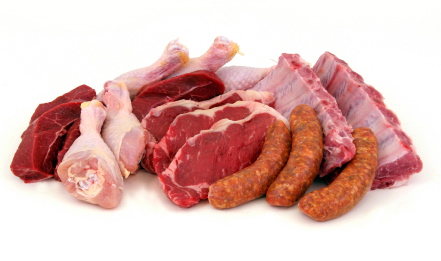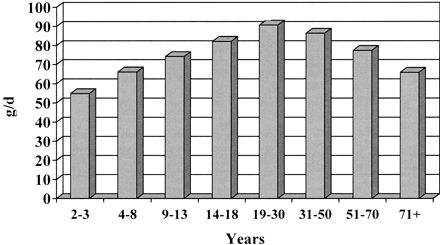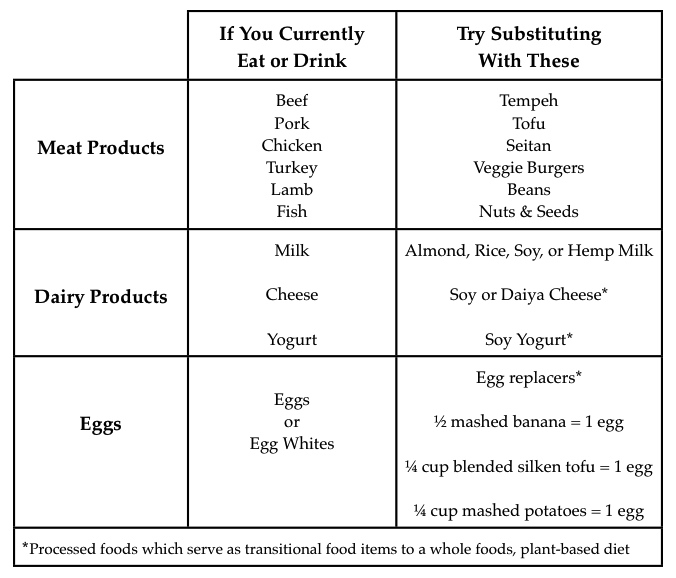Protein Myths and Facts
 We have a rich tradition in America of backyard barbeques and holiday gatherings where life, love, and laughter fill the air. At the center of these gatherings is always the prize centerpiece of protein... a thick, juicy steak, mouthwatering burgers, or a gigantic golden brown turkey. Mmmm! Delicious! It's what we've grown up on, and what we've been told we need in order to be strong and healthy. The protein phenomena is entrenched in American households.
We have a rich tradition in America of backyard barbeques and holiday gatherings where life, love, and laughter fill the air. At the center of these gatherings is always the prize centerpiece of protein... a thick, juicy steak, mouthwatering burgers, or a gigantic golden brown turkey. Mmmm! Delicious! It's what we've grown up on, and what we've been told we need in order to be strong and healthy. The protein phenomena is entrenched in American households.
But what if what was deeply entrenched in our up bringing was actually bringing us pain and suffering, leading to millions of premature deaths from heart disease, obesity, and cancer. What if we've got it all wrong?
Over the last several decades, the scientific community has actually proven that consuming animal-based protein is doing just this, leading to an array of chronic diseases including osteoporosis, heart disease, obesity, autoimmune disorders, and much more. This is not a ploy against the agriculture and ranching industry, nor is it a vendetta against all the meat lovers out there. The intent of this page is simply to give you the information and facts you need to take control of your own state of health. It's an invitation to open up your mind and learn how the human body actually functions, as you explore the facts below on protein in the human diet.
The Facts Behind Protein
1) Animal-Based vs. Plant-Based Protein
- Cancer Risk - Studies have shown that those eating a plant-based diet are 40% less likely to get cancer than their meat-eating counterparts.1-3 Harvard University found that people who ate beef, pork, or lamb on a daily basis had three times the risk of developing colon cancer compared to those who avoided these products.4,5 Another study showed those consuming white meat (mainly chicken) had a three times higher risk of getting colon cancer than vegetarians.6 A study in Japan showed that affluent women who ate meat daily had an 8.5 times higher risk of developing breast cancer than poorer women who ate meat rarely or never.7
- Bone Health - A study of elderly women analyzed 87 surveys in 33 different countries and found as the rate of animal protein consumption went up, so did the rate of bone fractures.8 Another study showed that when animal proteins were eliminated from the diet calcium loss in the body was cut by half.9
- Heart Disease Risk - When you eat animal-based proteins (beef, pork, chicken, milk, cheese, etc.) there is a higher amount of saturated fat content in these items. Sources of plant-based proteins (vegetables, whole grains, nuts, seeds, beans, etc.) are typically much lower in saturated fat. Saturated fat is one of the leading causes of increased LDL or "bad" cholesterol levels. Higher levels of LDL cholesterol are one of the greatest risk factors in developing heart disease.10 One study showed those who adopted a plant-based diet reduced their saturated fat intake by 23% and dramatically lowered their cholesterol levels in only six weeks time.11 Another study reviewed five large prospective studies and concluded vegetarians had approximately 25% lower risk of developing heart disease than non-vegetarians.12 The Paleo diet—high in animal protein from meat, fish, and eggs—was found to increase total and LDL cholesterol levels, increasing risk of heart disease, despite improvements in weight loss and cardiorespiratory fitness from the diet.13
- Weight Loss and Other Health Effects - High-protein diets consisting mostly of animal products—like the Atkins and Paleo Diets—have been shown to lead to moderate weight loss in the short term, but an actual increase overall risk of death in the long term.14 In a head-to-head study comparing four different diets, the high-protein Atkins Diet performed the worst of all four diets, resulting in an average weight loss of only 4.62 lbs after one year.15 The Atkins Diet has also been shown to increase LDL "bad" cholesterol, leading to a higher risk of heart disease, increase your risk of blood vessel and tissue damage, cause kidney stones, increase urinary excretion of calcium in the body, and even lead to an increase in the re-emergence of panic and anxiety symptoms in some people.16-19
- Diabetes Risk - Consumption of a high-protein diet consisting of regular meat consumption increases your risk of developing diabetes.20 Even fish increases your risk of developing type 2 diabetes, and the more fish you eat the higher chance of this happening according to data following 36,328 women over a 16-year period in the Women's Health Study.21 Meat-consuming omnivores are nearly twice as likely to develop type 2 diabetes compared to individuals who consume no animal-based proteins at all.22
How Much Protein Do You Need?
1) A minimum of 30 grams/day of protein is needed to meet the amino acid requirements of an adult man according to one early study on this topic.23
2) The World Health Organization (WHO) published data reporting a minimum protein intake of 0.66 grams/kg/day to meet the daily requirements in healthy adults.24
- For an individual with an ideal body weight of 68 kg (150 lbs) this would be 45 grams of protein per day.
3) The typical amount of protein in the Standard American Diet (SAD), which consists mostly of meat and dairy products, is between 66-91 grams/day.25 The graph below shows the average protein consumed per day in America based on age.

Source: American Journal of Clinical Nutrition, NHANES 2003-04.
4) Individuals eating more of a plant-based diet consume an average of 60-80 grams of protein per day, obtaining more than the required daily amount of protein they need.26
5) To put this in perspective, you can get a total of 18 grams of protein (about half your daily requirement) by eating the following breakfast:
- 1 bowl of oatmeal
- 1 banana
- 8 oz glass of almond milk
- 1 slice of whole grain toast with peanut butter spread on top
Plant-Based Substitutes for Animal-Based Proteins
The chart below is a great reference for animal protein substitutes. Some of the items (marked with an asterisk) are considered processed foods. While still plant-based foods, these are not considered health foods. Therefore, they should be used minimally, or as transition foods while transitioning from an animal-based diet to a whole foods, plant-based diet.

To learn more about protein in the human diet read my article - 35 Ways to Counter the Vegan Protein Interrogation.
References:
1 Thorogood M, Mann J, Appleby P, McPherson K. Risk of death from cancer and ischaemic heart disease in meat and non-meat eaters. Br Med J 1994;308:1667-70.
2 Chang-Claude J, Frentzel-Beyme R, Eilber U. Mortality patterns of German vegetarians after 11 years of follow-up. Epidemiology 1992;3:395-401.
3 Chang-Claude J, Frentzel-Beyme R. Dietary and lifestyle determinants of mortality among German vegetarians. Int J Epidemiol 1993;22:228-36.
4 Giovannucci E, Rimm EB, Stampfer MJ, Colditz GA, Ascherio A, Willett WC. Intake of fat, meat, and fiber in relation to risk of colon cancer in men. Cancer Res 1994;54(9):2390-7.
5 Willett WC, Stampfer MJ, Colditz GA, Rosner BA, Speizer FE. Relation of meat, fat, and fiber intake to the risk of colon cancer in a prospective study among women. N Engl J Med 1990;323:1664-72.
6 Fraser GE. Associations between diet and cancer, ischemic heart disease, and all-cause mortality in non-Hispanic white California Seventh-day Adventists. Am J Clin Nutr 1999;70(suppl):532S-8S.
7 Hirayama T. Epidemiology of breast cancer with special reference to the role of diet. Prev Med 1978;7:173-95.
8 Frassetto LA, Todd KM, Morris C, Jr., et al. Worldwide incidence of hip fracture in eldery women: relation to consumption of animal and vegetable foods. J. Gerontology 55 2000:M585-M592.
9 Remer T, Manz F. Estimation of the renal net acid excretion by adults consuming diets containing variable amounts of protein. Am J Clin Nutr 1994;59:1356-61.
10 Woodside JV, McKinley MC, Young IS. Saturated and trans fatty acids and coronary heart disease. Curr Atheroscler Rep. 2008 Dec;10(6):460-6. Review.
11 Masarei JR, Rouse IL, Lynch WJ, Robertson K, Vandongen R, Beilin LJ. Vegetarian diet, lipids and cardiovascular risk. Aust NZ J Med. 1984;14:400-4.
12 Key TJ, Fraser GE, Thorogood M, Appleby PN, Beral V, Reeves G et al. Mortality in vegetarians and nonvegetarians: detailed findings from a collaborative analysis of 5 prospective studies. Am J Clin Nutr 1999; 70(3 Suppl):516S-524S.
13 Smith M, Trexler E, Sommer A, et al. (2014) "Unrestricted Paleolithic Diet is Associated with Unfavorable Changes to Blood Lipids in Healthy Subjects," International Journal of Exercise Science. 2014; 7(2), Article 4. Available at: http://digitalcommons.wku.edu/ijes/vol7/iss2/4
14 Fung TT, van Dam RM, Hankinson SE, et al. Low-Carbohydrate Diets and All-Cause and Cause-Specific Mortality. Ann Int Med 2010;153(5):289-298.
15 Dansinger, M. L., Gleason, J. A., Griffith, J. L., Selker, H. P., and Schaefer, E. J. Comparison of the Atkins, Ornish, Weight Watchers, and Zone diets for weight loss and heart disease risk reduction: a randomized trial. JAMA 1-5-2005;293(1):43-53.
16 McAuley, K. A., Hopkins, C. M., Smith, K. J., McLay, R. T., Williams, S. M., Taylor, R. W., and Mann, J. I. Comparison of high-fat and high-protein diets with a high-carbohydrate diet in insulin- resistant obese women. Diabetologia 2005;48(1):8-16.
17 Beisswenger, B. G., Delucia, E. M., Lapoint, N., Sanford, R. J., and Beisswenger, P. J. Ketosis leads to increased methylglyoxal production on the Atkins diet. Ann N Y Acad Sci 2005;1043:201-210.
18 Reddy, S. T., Wang, C. Y., Sakhaee, K., Brinkley, L., and Pak, C. Y. Effect of low-carbohydrate high-protein diets on acid-base balance, stone-forming propensity, and calcium metabolism. Am J Kidney Dis. 2002;40(2):265-274.
19 Ehrenreich, M. J. A case of the re-emergence of panic and anxiety symptoms after initiation of a high-protein, very low carbohydrate diet. Psychosomatics 2006;47(2):178-179.
20 Psaltopoulou T, Ilias I, Alevizaki M. The role of diet and lifestyle in primary, secondary, and tertiary diabetes prevention: a review of meta-analyses. Rev Diabet Stud. 2010 Spring;7(1):26-35.
21 Djoussé L, Gaziano JM, Buring JE, Lee IM. Dietary omega-3 fatty acids and fish consumption and risk of type 2 diabetes. Am J Clin Nutr. 2011 Jan;93(1):143-50.
22 Barnard N, Levin S, Trapp C. Meat Consumption as a Risk Factor for Type 2 Diabetes. Nutrients. 2014;6(2):897-910.
23 Rose W. The amino acid requirements of adult man. Nutritional Abstracts and Reviews. 1957;27:631.
24 Joint FAO/WHO/UNU Expert Consultation. Protein and Amino Acid Requirements in Human Nutrition. WHO Library Cataloguing-in-Publication Data. 2002;8.3:149-150.
25 Victor L Fulgoni, III. Current protein intake in America: analysis of the National Health and Nutrition Examination Survey, 2003-2004.
26 Hardage M. Nutritional studies of vegetarians. Journal of the American Dietetic Association. 1966;48:25.
